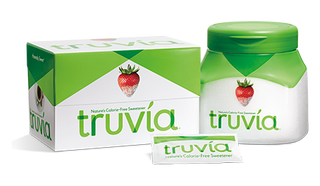The name is a bit of a tongue twister. Truvia pronounced Tru-VEE-a. But, you might have noticed this new zero calorie sweetener that is 200 times sweeter than sugar. This may sound too good to be true but Truvia is a natural sweetener derived from the leaves of the stevia plant. A joint venture between Coca-Cola and Cargill (an international food provider), Truvia is now widely in a wide variety of products.
Rebiana is the trade name for the stevia-derived sweetener while Truvia is the consumer brand name. The food additive was developed to meet strong consumer demand for a natural, zero calorie way to sweeten foods and beverages. This is an important consideration given that 75% of food additive related complaints in the U.S. are related to Aspartame (brand names NutraSweet®, Equal®, Spoonful® and Equal Measure®).
Commonly grown in South and Central America as well as China, stevia is also known as sweetleaf or sugarleaf. To make Truvia, stevia leaves are harvested, dried and allowed to soak in fresh water, similar to the process of preparing tea. This is followed by an isolation and purification process which results in the development of the natural sweetener.
Historically, stevia has been used around the world as a natural sweetener and as a medicinal herb to treat heartburn and other ailments. In the United States, stevia products labeled as dietary supplements have been available since 1991. The debut of Truvia will mark the first time stevia has been approved for use in the U.S. as a food additive.
In its natural state, stevia is 30 to 45 times stronger than sucrose (sugar) and becomes even sweeter with processing. It is both calorie and carbohydrate free and thus a great choice for people watching their caloric intake. Studies have shown stevia does not adversely affect blood glucose or insulin levels so people with diabetes can safely utilize it as a sugar substitute. It is also non-carcinogenic, and dentists rejoice - does not promote tooth decay.
Despite the positive attributes of stevia, there has been some controversy surrounding the sweetener. One study in the mid 1980s reported the production of a mutagen in animals as a by-product of stevia ingestion. However, the findings from this study were later discounted due to reported flaws in data collection and reporting. Animal studies have shown mixed results with findings ranging from parts of the stevia leaf appearing to be a weak mutagen to no safety issues found.
Other animal studies have shown promise, especially in the realm of diabetes. Stevia has been shown to improve insulin sensitivity in rats, and can potentially promote insulin production which could lead to a reversal of diabetes and metabolic syndrome. The World Health Organization released a safety evaluation in 2006 stating no evidence of carcinogenic activity. It also alluded to the benefits of stevia for people with hypertension or diabetes but suggested further research was necessary to more clearly determine optimum usage and dosage.
In terms of evaluating the safety of stevia, one can look to its use in Japan. The Japanese have been using stevia as a commercial sweetener since the early 1970s without reported harmful effects. It is used in food products, soda (including Coca-Cola), and as a substitute for table sugar. Today, more stevia is consumed in Japan than anywhere else in the world and it accounts for 40% of the Japanese sweetener market.
In addition to health controversy, stevia has also been at the center of some political controversy. In the late 1980s an anonymous complaint was filed with the FDA. As result of the complaint, the FDA restricted the import of stevia and it was labeled as an unsafe food additive. This restriction was considered controversial because it violated one of the FDA’s own guidelines which states any natural substance used prior to 1958 with no reported adverse effects should be generally recognized as safe (GRAS).
Adding to the mystery, the FDA has never revealed the source of the original complaint leading many industry insiders to speculate the complaint was filed by makers of an artificial sweetener fearing competition. The FDA also mandated the destruction of three books on stevia which were produced by a Texas-based distributor of stevia supplements. This mandated destruction never occurred however due to the involvement of the media, the ACLU, and public outrage.
Stevia is an established, well-documented sweetener and is a good natural alternative to artificial sweeteners. Deciding which sweetener to use is a matter of personal preference and taste. Stevia has its own special flavor and does not taste exactly like sugar, honey, or any other artificial sweetener. Your choice will likely depend on if you are planning to sweeten your coffee or tame the tartness of a grapefruit. Be prepared for some trial and error as you incorporate it into your dietary plan.
Short and Sweet Tips for Sugar Substitution
- No matter which sweetener you incorporate into your diet be sure to limit your intake of high-calorie, nutritionally-empty foods which tend to be high in sugar.
- Instead of processed foods, choose fresh fruit to tame your sweet tooth and obtain vitamins, minerals, antioxidants, phytochemicals and fiber.
- If you are diabetic, eating whole fruit can help moderate blood sugars.
- Retrain your taste buds to appreciate the taste of foods without piling on sugar or sugar substitutes.
- Set a good example for your kids by using sugar substitutes in moderation.

